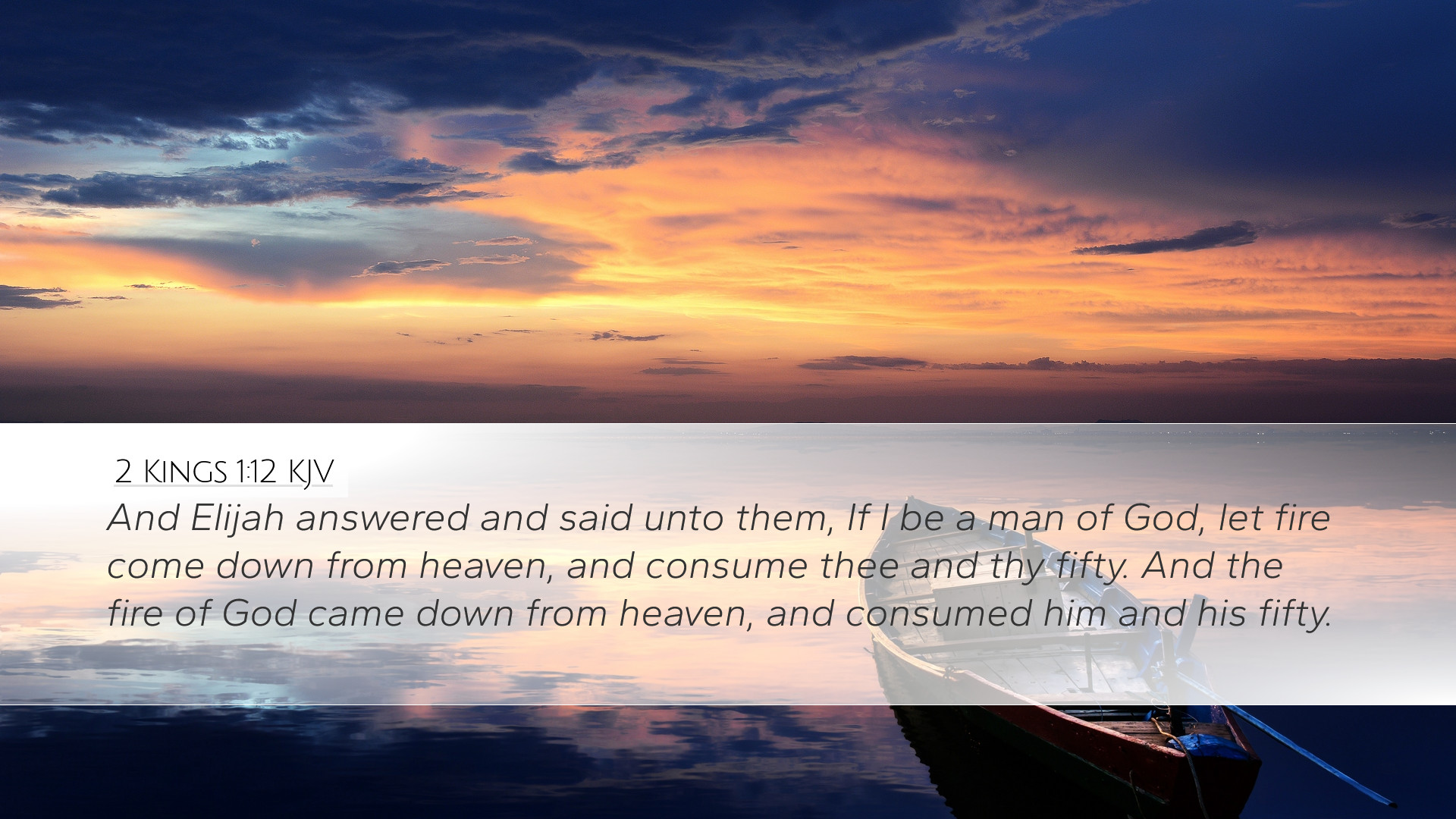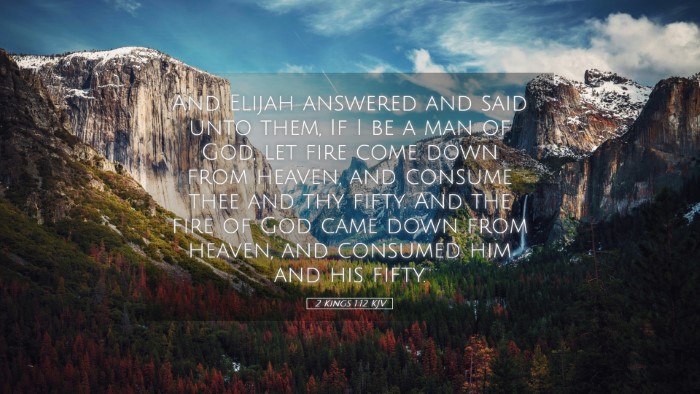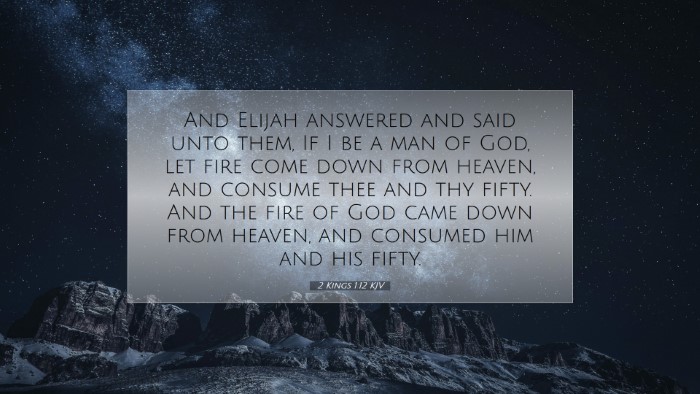Old Testament
Genesis Exodus Leviticus Numbers Deuteronomy Joshua Judges Ruth 1 Samuel 2 Samuel 1 Kings 2 Kings 1 Chronicles 2 Chronicles Ezra Nehemiah Esther Job Psalms Proverbs Ecclesiastes Song of Solomon Isaiah Jeremiah Lamentations Ezekiel Daniel Hosea Joel Amos Obadiah Jonah Micah Nahum Habakkuk Zephaniah Haggai Zechariah Malachi2 Kings 1:12
2 Kings 1:12 KJV
And Elijah answered and said unto them, If I be a man of God, let fire come down from heaven, and consume thee and thy fifty. And the fire of God came down from heaven, and consumed him and his fifty.
2 Kings 1:12 Bible Commentary
Commentary on 2 Kings 1:12
Verse Text: "But Elijah answered and said to them, 'If I am a man of God, let fire come down from heaven and consume you and your fifty.' And the fire of God came down from heaven and consumed him and his fifty."
Introduction
This verse reveals a significant moment in the life of the prophet Elijah as he confronts the authority of King Ahaziah and demonstrates God’s power through divine judgment. Understanding this moment demands a careful analysis of the surrounding narrative, the theological implications, and the character of Elijah as a prophetic figure in Israel's history.
The Context of 2 Kings 1
2 Kings 1 details Ahaziah's inquiry of Baal-Zebub regarding his health after a fall. In response, God sends Elijah to deliver a message of judgment. The backdrop of conflict between the worship of Yahweh and pagan idolatry is crucial in interpreting this passage.
Commentary Insights
Elijah's Authority and Prophetic Role
- Matthew Henry: Henry emphasizes Elijah's role as a messenger of God, illustrating the boldness required in a prophet to confront idolatry. His challenge against the king's emissaries highlights his conviction in Yahweh’s sovereignty.
- Albert Barnes: Barnes elaborates on the direct challenge Elijah presents: “If I am a man of God…” Underlining Elijah’s complete assurance in his divine mission. This assertion serves not only to endorse his prophetic ministry but also to invoke God’s immediate intervention.
- Adam Clarke: Clarke notes the audacity of Elijah's declaration, pointing out the severe implications of invoking divine fire. It signifies the ultimate endorsement of divine authority and a serious warning against transgressing God’s commands.
The Significance of Divine Fire
The response of fire coming down from heaven serves as a potent symbol of God's judgment and power. This act of consuming the captain and his fifty not only affirms Elijah's prophetic declaration but also reestablishes the fear of the Lord among the people of Israel.
- Matthew Henry: He remarks that this event “demonstrates the power of God over all opposition.” God's fire consuming the soldiers served as a stark reminder of the seriousness of disobedience to God.
- Albert Barnes: He draws attention to the scriptural precedence of divine fire, referencing similar instances in biblical text, highlighting God's ability to intervene in the physical realm dramatically.
- Adam Clarke: Clarke further expounds on the fire’s significance, stressing that it represents God’s holiness and righteousness, which cannot coexist with the unfaithfulness represented by Ahaziah’s inquiries.
Theological Implications
This passage poses significant theological questions regarding authority, faithfulness, and the seriousness of sin:
- Divine Authority: Ahaziah's disregard for God's prophets demonstrates the rebellion against divine authority. Elijah's response serves as a reminder that God is not to be mocked and will confirm His authority through signs and wonders.
- Judgment and Mercy: Though the immediate response is one of judgment, it also reflects God's continuous call for repentance. The swift action taken by God serves as both a warning and a call to turn back to Him.
Application for Today
For pastors, theologians, and students of Scripture, this passage serves as a critical reminder of the character of God as both holy and just. The realities of divine authority can challenge contemporary assumptions about freedom and authority:
- Faithfulness in Ministry: Leaders today must take heed of their responsibility to proclaim God’s truth boldly, reflective of Elijah's unwavering commitment in the face of opposition.
- The Call to Righteousness: This passage encourages an examination of personal and communal faithfulness. The seriousness of sin and divine judgment should prompt a call to repentance within our communities.
Conclusion
2 Kings 1:12 encapsulates the tension between human authority and divine power. Elijah's encounter with the king’s men is a historical narrative that transcends its time, calling present readers to a deeper understanding of God's nature, a call to faithful ministry, and an urgency towards righteous living.


